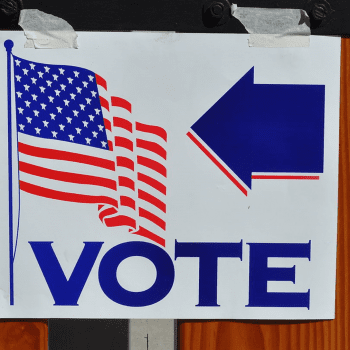![https://commons.wikimedia.org/wiki/File%3AHillary_Clinton_official_Secretary_of_State_portrait_crop.jpg; By United States Department of State (Official Photo at Department of State page) [Public domain], via Wikimedia Commons](https://wp-media.patheos.com/blogs/sites/533/2016/08/Hillary_Clinton_official_Secretary_of_State_portrait_crop.jpg)
Three choices.
- She doesn’t want to.
- She doesn’t need to.
- She isn’t able to.
As background, after the observations on Clinton’s speech that I wrote up on Friday morning, I thought I had a great idea for a post. I would take her platform, as found on her campaign website, and see what offered “triangulationability” or even was more moderate than she gets credit for in the first place. I didn’t get very far, as it was slim pickin’s.
Abortion? She and her party and the abortion rights movement to which it feels it must conform, have become more radical: with a promise to repeal the Hyde Amendment that prohibits government funding of abortion, and with liberal hand-wringing that Tim Kaine calls himself “personally opposed,” which is contrary to the current line that abortion is a positive good to be celebrated.
Government spending? Extensive promises of new government programs (free college, free preschool, parental leave, enhanced Social Security, increased spending on schools, etc.) to be paid for by the trio of the rich, Wall Street, and corporations (with, at the same time, promises of tax breaks for favored companies) or imagined to be “paying for themselves,” e.g., the notion that infrastructure “investements”/spending will grow the economy to a sufficient degree as to pay for themselves in added tax revenue.
Immigration? A “reform” that means, seemingly exclusively, legalization for everyone, and promises to expand executive amnesty, and deport only those who “pose a violent threat to society” in the meantime.
With respect to foreign policy and military spending? Maybe. She says, “We should maintain the best-trained, best-equipped, and strongest military the world has ever known.” But her actual bullet points are to “create budgetary certainty” and “create a defense budget that reflects good stewardship of taxpayer dollars,” which are not reassuring to defense hawks.
And traditionally conservative concerns that make for easy “crossover” support? How hard would it be to cast her spending proposals as “conservative” by saying that she’d reform welfare so that there are no “marriage penalties” in the system? There’s also not even a nod to budget deficits anywhere in her “issues.” And it was stunning that, in her speech, what she claimed would be the centerpiece of bipartisan cooperation was a massive government spending program. (See my Friday post link, above.)
As Ross Douthat observed, she is not making an effort to reach out to moderates, and
. . . the absence of outreach is still notable, especially in a campaign that the Democrats are casting as a kind of national emergency.
I won’t accuse them of putting party ahead of country — the party that nominated Donald Trump has cornered the market on that sin.
But strategically there are risks. The Clinton campaign needs to expand on the Obama coalition somewhere to make up for its likely losses among working-class white men. But it’s assuming that it can afford to be more left-wing than Obama while doing so, relying on the fear that Trump instills rather than any ideological inducements to bring some Romney voters inside its tent.
And over at Marginal Revolution, Tyler Cowen writes,
if you agree that defeating Trump is a national emergency, do you also think the Democrats should be compromising more on actual policies?
So back to my three possible answers to the question in my post title.
Choice #1: She doesn’t want to moderate her positions. To be sure, Bernie Sanders forced her into ever more generous promises, such as the continued increases in generosity of the promise for free college, but she’s always preferred a very generous welfare state and is probably a bit relieved to have needed to take the mask off, and no longer play the role of pragmatist.
Consider, too, that this year to a degree greater than prior years, the Democratic message (and, admittedly, not just theirs) is that Donald Trump is bad, bad, bad, so much so that to vote for him is not just imprudent, but immoral. And once you come to believe that a certain choice would be immoral, then you’re much more likely to believe that there should be no “negotiating” to try to dissuade the individual from making that choice, because that person (or those voters) shouldn’t need incentives not to do something immoral.
Choice #2: She doesn’t need to triangulate. Or, at least, she judges that she’ll get the votes of disenchanted Republicans no matter what — or that, at a minimum, those voters won’t vote for Trump, which is good enough. And if you think you hold all the cards, you’re not going to negotiate, but simply wait for your negotiating partner to give in.
Now, to be sure, Cowen (who borrowed and credited the line to a William Easterly tweet) is taking the Glenn Reynolds approach. Reynolds, readers may recognize, is the one who says, whenever a celebrity environmentalist spends ostentatiously on an enormous house or flies in a private jet, or whenever an environmentalist NGO gathers in a tropical location by private jet, links to the report with the line, “I’ll believe it’s a crisis when the people who tell me it’s a crisis act like it’s a crisis.” Here, too, Douthat and Cowen both argue that if there is a “crisis” — a risk of an unsound man being elected — rather than just routine politics, then Clinton ought to be willing to compromise her cherished policy dreams in order to avoid that crisis.
Choice #3: She can’t triangulate without leftist voters staying home. Look at the comments to the Douthat article. When I read them last night, I had the impression of a general tone that Douthat has no business suggesting that Clinton moderate her positions, because they are true and right and anything less would be a betrayal of her supporters. And, of course, at the convention, Sanders supporters were hardly willing to fall in line, with protests both inside and outside of the convention hall. Presumably polling could have revealed that any concessions or attempts to speak to moderates would come at the cost of Sanders voters.
The answer, of course, is all of the above.
Image: https://commons.wikimedia.org/wiki/File%3AHillary_Clinton_official_Secretary_of_State_portrait_crop.jpg; By United States Department of State (Official Photo at Department of State page) [Public domain], via Wikimedia Commons












